#areala (warrior nun)
Explore tagged Tumblr posts
Text

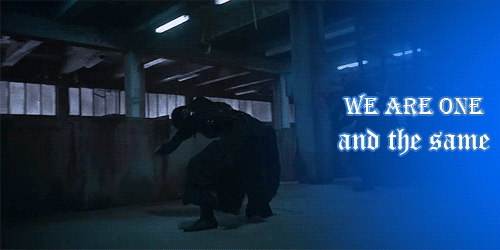


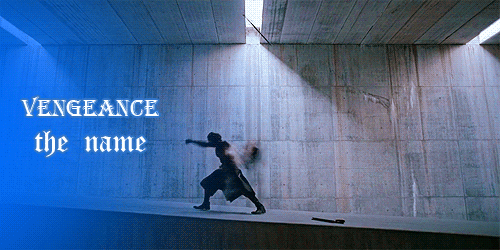
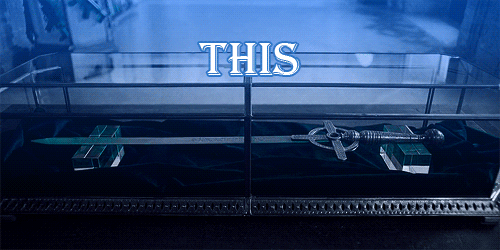



Warrior Nun x Amon Amarth "Vengeance is My Name"
#warrior nun#ava silva#mother superion#areala#you absolutely need to listen to the song to understand the this is my sword part. it goes: THIS! IS! MY! SWORD!#you people with your taylor swift and hozier and ames... meanwhile i think wn is pure metal#(granted maybe not viking metal but this idea has been in my mind forever)#(emylilas suggested i made a video edit but i'm no good at that so gifs it is! thanks for the incentive either way my friend)#anyway. trying something a bit different here clearly#sister makes gifs once in a blue moon#gifs and other visuals#this has been sitting in my drafts for weeks and i guess it's time to release it into the world. be nice now!
154 notes
·
View notes
Text
Warrior Nun characters as latin quotes
Ava: Aut viam inveniam aut faciam (I shall either find a way, or make one)
Lilith: Veni, Vidi, Vici (I came, I saw, I conquered)
Adriel: Flectere si nequeo Superos, Acheronta movebo (If I cannot bend Heaven, I will raise Hell)
Beatrice: Amor omnia vincit (love conquers all)
Mother Superion: Si vis pacem, para bellum (if you desire peace, prepare for war)
Camila: In omnia paratus (ready for everything)
Yasmine: Fores fortuna adiuvat (Fortune favors the brave)
Jillian: Sapere aude (dare to know)
Michael: Non est ad astra mollis e terris via (there is no easy way from the earth to the stars)
Mary: Familia ante omnia (family over all)
Areala: Non desistas non exieris (never give up, never surrender)
Vincent: Igne natura renovatur integra (through fire, nature is reborn whole)
Duretti: Et tu, Brute? (You also, Brutus?)
Reya: Fiat lux! (let there be light!)
Kristian: Tantum religio potuit saudere malorum (To such heights of evil has religion been able to drive men)
Shannon: Ubi amor, ibi dolor (where there is love, there is pain)
#warrior nun#warrior nun meme#ava silva#sister lilith#adriel#sister beatrice#mother superion#sister camila#sister yasmine#jillian salvius#michael salvius#shotgun mary#areala de cordoue#father vincent#pope duretti#reya#diary pages#warrior nun fandom#wn fandom#im really bitter i didn't get to use oderint dum metuant and alea iacta est#some of these vere surprisingly hard beatrice for example because i'm so disconnected from her#this was harder than i thought fr#I was REALLY tempted to use Deus vult for areala XD#magnum opus of wn memes?#and i'm ✨procastrinating✨
176 notes
·
View notes
Text
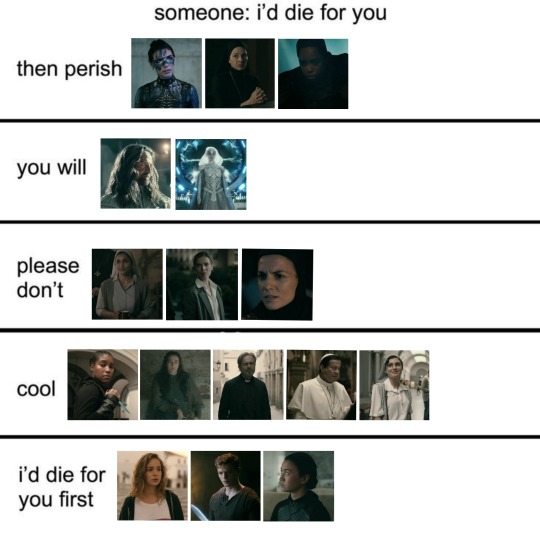
I made another one of these
#warrior nun#warrior nun meme#warrior nun fandom#wn fandom#ava silva#adriel#sister lilith#lilith villaumbrosia#mother superion#reya#sister yasmine#jillian salvius#sister shannon#shotgun mary#areala of cordoba#father vincent#pope duretti#sister camila#michael salvius#sister beatrice#i have been neglecting wn for a while#but i am working on the biblical au#diary pages#i guess it fits more in diary pages than scrapbook
69 notes
·
View notes
Text
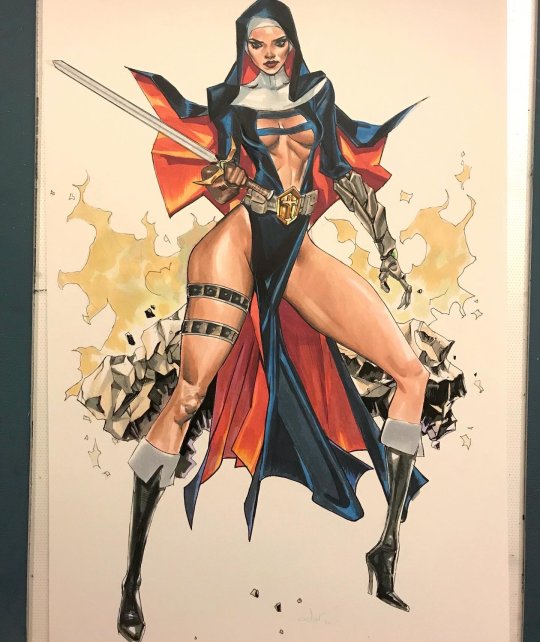
Warrior Nun Areala
Art by Celal Koc
37 notes
·
View notes
Text

Wonderful illustration by Ted Nomura featured in Warrior Nun Areala: Portraits (1996)
#nunposting#catholicsm#catholic core#christianity#art#nuns#illustration#manga#warrior nun areala#warrior nun#90s
7 notes
·
View notes
Text
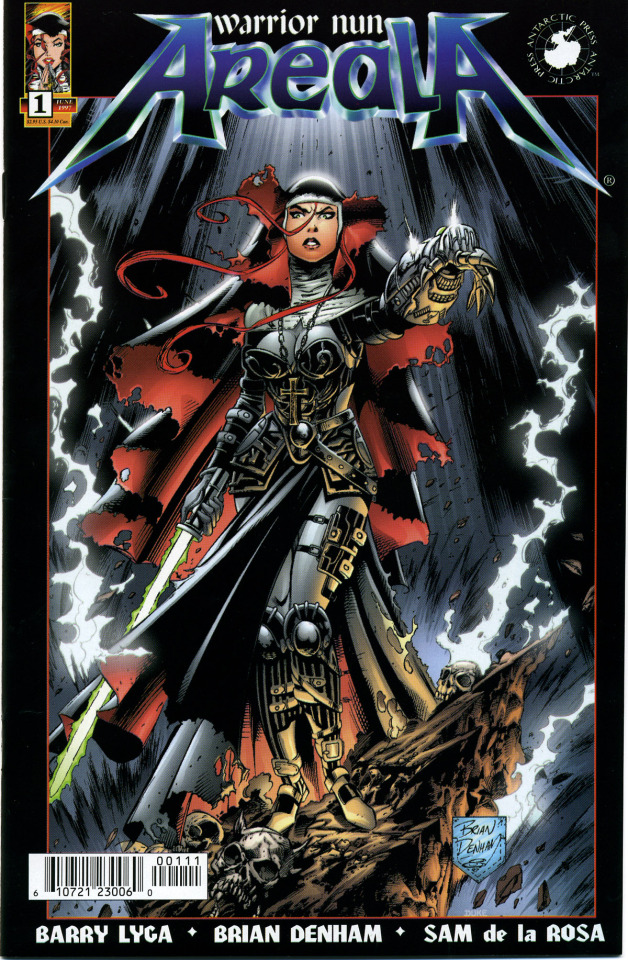
12 notes
·
View notes
Text
Warrior Nun Rewatch 1×09-1×10
Our rebel Sister Warriors infiltrate the Vatican to steal the bones from Adriel’s tomb. This is Ava’s first big mission and everything has come down to this. She is already fumbling along while Beatrice tries to keep her in line.
“Trust your team.”
While casting their votes for the new Pope, Duretti’s Divinium ring lights up. He alerts the other nuns that Ava is here.
Mother Superion joins their fight and Ava learns that she was previously a Warrior Nun. Ava’s shocked as, to her knowledge, no Warrior Nun lives to see their successor. But the Halo rejected Mother Superion.

There’s so much pain in Superion’s face at the memory. So much shame.
I couldn’t help but think of how honour was/is valued in ancient civilizations and other institutions. In Ancient Greece specifically, a soldier’s worth was determined by their accolades: how many kills they had on the battlefield, how many war prizes they took, how many cities they plundered. Honour was represented by material things that could be taken away at any time. Their ultimate goal was to die on the battlefield in a blaze of glory so that bards would sing their names and stories forever. That was immortality.
To return home empty-handed or to fail in the line of duty was a fate worse than death. You lived the rest of your days in shame. No title. No riches. No recognition.
Unless you got the chance to prove yourself again. In defecting from Duretti and the institution for Ava and her team, Mother Superion takes the first step towards redemption. Her failure propels her towards a different choice: putting the welfare of her girls before a man’s consolidation of power.
She tells Ava that she should’ve listened to Vincent. Ava is worthy. And the tenderness Ava shows her by readjusting her habit is a beautiful moment of respect, one that says the same thing Mary says to Lilith: “I see you.”
Ava is not happy to learn that Beatrice brought backup explosives just in case Ava can’t do the job.
“You don’t think I can do this.”
Given that Beatrice has been the one training her, it feels like a very singular “You” here. The two of them have already developed quite a bond in their short time together, so Ava cares about Beatrice’s opinion. To find this out on the “homestretch��� of their journey is quite a slap in the face.
“I know you can do this. We all do,” Beatrice says. “We’re just not certain you will do this. Being a team player isn’t exactly your forte. You do what’s best for Ava: flight, not fight. That’s where your instincts lie.”
It’s accurate, if not difficult to hear. And it’s eerily similar to the argument they have in 2×02 where Beatrice says that Ava just does whatever she wants.
But Ava is determined to prove her wrong this time.
“But things change when you realize not everything’s about you.”
This brings a smile to Beatrice’s face. Ava is putting the mission first.
And we even get the same cross imagery on the wall behind Ava when Beatrice uses the projector to measure the tomb.


Lilith, meanwhile, is back at the lab with Jillian and keeping close to herself. Jillian realizes that Lilith can teleport and has regenerative healing abilities, but before she can confront her, she sees her heading to Michael’s room.
Michael is drawing pictures of Adriel. He tells Lilith that she’s too late. Ava’s already at the door.
Lilith races to the Vatican to stop them. She’s the only one who knows the truth: that they’re about to release the devil.
After taking out Crimson once and for all, she engages Ava and Beatrice in the crypt. Mary shows up and restrains her, talking her down.
If only they had known. They were sending Ava into a death trap.
They learn as well while she’s moving through the wall that the Tarasks are the original source of Divinium, not Adriel’s armour. Beatrice surmises that they were coming for the bones, too, but it’s actually a step further. They were after Adriel himself for his crimes against Reya.
Ava is terrified when she gets there. Her comms have cut out and her flashlight goes dark. She’s trapped and alone, and there are no bones waiting for her. Instead, it’s the real villain of our story: Adriel.
Feels a lot like the ambush in season two, doesn’t it? 😭
The thing that makes Adriel such a compelling villain in 1×10 is that he tells us things that sound very believable. Especially in an institution like the Catholic church, we’re very familiar with corruption. We know all too well how men vie for power. It’s not hard to imagine the church imprisoning Adriel for their own gain or making Areala their pawn. And Adriel tells Ava that he doesn’t even blame Areala.
But the part that got me the most was him explaining that he was never blind to the human world. All the pieces of his armour are connected to him; through them, he can see and hear what’s going on in the outside world. And because all the Divinium in the OCS’ possession came from his armour, all their information goes back to the same person.
It’s not Divinium in general that allows people to connect to Adriel. It’s the pieces of his armour. That finally explains why Adriel was always a step ahead of them in season two! He didn’t need to possess Camila to infiltrate their base of operations. Ava had his Divinium sword strapped to her back! He would’ve heard everything.
Michael’s body is seeded with Divinium. He was the perfect conduit, the perfect pawn.
While looking for Jillian, Kristian walks into her office with Michael’s pictures all over the walls. He sees the full picture now, the full vision – that the Ark is proof of the beyond, that Adriel is real and is coming, and that this moment is just at hand. I think he finally gets the miracle he was seeking for so long. That’s why he joins Adriel.
Standing before Adriel, Ava is faced with that impossible choice: to help the church or help her family. She wants to end the cycle of pain, end the deaths of Warrior Nuns. She thinks in this moment that Adriel can help her, that they can take down the church together. But that means giving up the Halo. After all, she’s told that it was stolen from him.
And because Ava is the self-sacrificing person that she is, she agrees. As long as it means the safety of her friends, she doesn’t care what happens to her.
But then Adriel touches her back and she sees it: Areala screaming in pain while Adriel raises the Halo above her. Ava draws back.
Danger.
Outside the tomb, the others are prepping to blow the wall. Ava’s been in there too long and they’re worried.
Mother Superion says she has to find Camila.
Adriel shows Ava the vision of how Areala first met Adriel. She was in the midst of a war, cutting through men left, right, and center. Then, finally, she went down. All of her men rallied around her.
And then Adriel appeared out of a void, the Halo in hand. He used it to close the door behind him, but a minute later, a Tarask followed. It chased him through the fortress and he used the Halo to fight it off. Only when it was dead did he go to Areala.
The men, awed by what they had just seen – this supernatural (but humanoid) being fighting off a demon – could never have known who or what Adriel truly was. They wouldn’t have known he was being chased for a reason.
But this works in Adriel’s favour. Now he has people to follow him. They see another Tarask about to emerge and Adriel drives the Halo into Areala’s/Ava’s back. The orange light flickers and vanishes. They don’t come through.
The Halo was never a gift. He was just trying to get the Tarasks off his back. For the next thousand years, they would chase down the Warrior Nun while he got off scot-free.
Areala confronts him the next morning and we’re reminded that she’s an atheist. She sees through Adriel at once. She’s like, “You lie like a man. You’re no angel. That’s just what you want us to think.”
And he admits the truth. He says that men see what they want to see and promises her that if she exposes him, he will take back the Halo and leave her for dead.
Now armed with the truth, Ava tells Adriel to suck it.
He asks why she thinks she was sent here, revealing that she was just a pawn all along. Then he shoves his hand into her chest.
As the power of the Halo flares, the Ark fires up. Michael says that he’s coming and races towards it. “Come with me, Mummy!” he cries, and then he’s gone.
Ava screams, blasting Adriel away from her, and the ceiling comes down on their heads.
Jillian stands at the empty Ark and sobs.
As the rumbling starts in the crypt, Lilith looks at Beatrice. “I tried to warn you.”

Beatrice arms the charges and blows the crypt just as Duretti is about to give his speech.
One thing Ava has been excellent at doing from day one: screaming. Beatrice is the first one to her side.
Vincent carries her out of the tomb and through his torn sleeve, we can see his Divinium tattoos light up. Then they’re all racing back upstairs.
Mother Superion confronts Duretti and says she knows he killed Shannon.
The rest of them meet up with Camila and Ava says to let her down. She’s regaining feeling in her legs again. She tells them that Adriel’s alive and not an angel.
And then the devil himself appears.
Mother Superion quickly realizes that Duretti doesn’t know what she’s talking about: not Shannon, not the bones, any of it. As the realization hits her, she staggers. Vincent walks up to Adriel and attempts to talk him down, saying that he will get the Halo in time. For now, he’s won.
The girls realize with horror that Vincent has been playing them all for fools. He killed Shannon. Mary is ready to rip his head off, but Lilith intercedes. “I’ll handle this.”
I love that she’s the one who steps up here because it puts all her previous baggage behind her. Long past the girl who went to war with her sisters, now she’s the avenger coming to right all the wrongs: to stand up for Shannon, unjustly taken; to stand up for Ava, used and deceived; to stand up for Mary, who trusted this man when he murdered her love in cold blood.
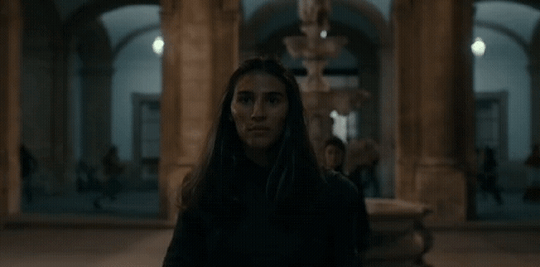
Lilith walks right up to Adriel and tells him he’s a thief.
The fight that ensues is one of the best choreographed sequences I’ve ever seen. Our girls converge on Adriel like a pack of wolves. It is the crown jewel of season one.
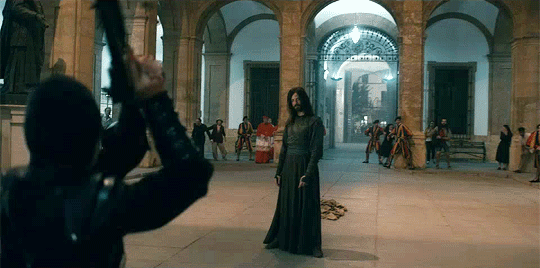
Camila’s double headshot still takes the cake and the look they give Vincent as they pass says one thing: You’re next.
They all turn when Adriel gets up, but it’s no matter to them. As Beatrice says, “We only needed seven minutes.”
And there’s our girl Ava, Divinium sword in hand.

(I still wish we got to see this fight! 😤😫)
Before she can rain down hellfire, however, Adriel summons his army of wraith demons. All the assembled people in the courtyard are possessed and move in towards them.
Mary breaks rank and throws herself into the fire. “In this life!”
I’ve said it before and I’ll say it again now: no body, no death!
#Warrior Nun#Warrior Nun 1x09#Warrior Nun 1x10#Ava Silva#Sister Beatrice#Mother Superion#Father Vincent#Adriel#Sister Lilith#Shotgun Mary#Sister Camila#Cardinal Duretti#Jillian Salvius#Areala#Sister Shannon#I can't get over all the parallels and symbolism in this show#Avatrice#Warrior Nun 2x02#Warrior Nun 2x08#Warrior Nun Saved
19 notes
·
View notes
Text

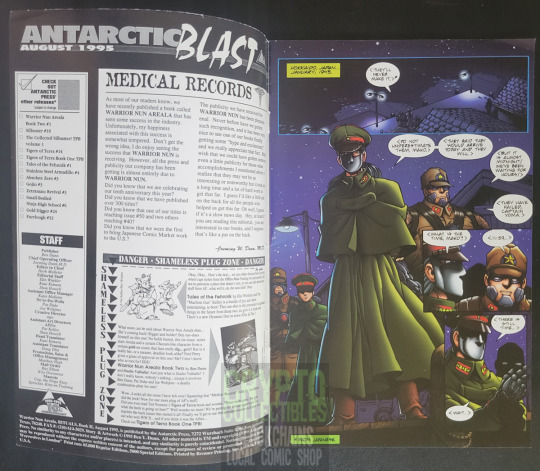
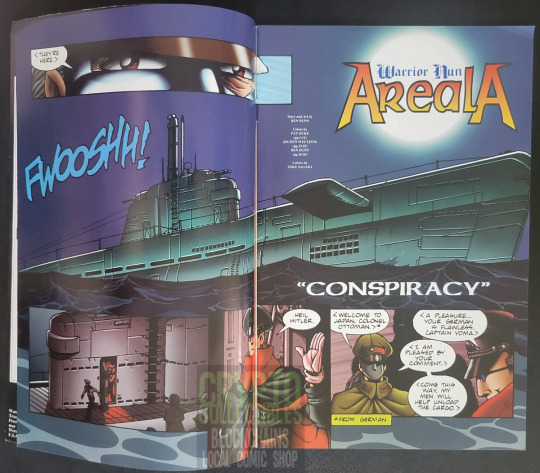



Warrior Nun Areala Rituals #1 (April 1995) by Antarctic Press
Written and drawn by Ben Dunn.
#Warrior Nun Areala#Warrior Nun Areala Rituals#1995#Antarctic Press#Etsy#Vintage Comics#Comic Books#Comics#Ben Dunn#Anime#Manga#Nun#Cheetah Diggers#Colonel Ottoman
2 notes
·
View notes
Text
Lycanology, as studied by Areala Cotallere Chapter 1.
#much shorter update! i wanted this info to be known. buildin a lil somethin somethin with lilith and beatrice's wolves.#couldn't fit the info into an actual chapter so here! areala's book#warrior nun#fic: a beating heart overheard#lycanology#warrior nun fanfic#fanfiction#my writing
4 notes
·
View notes
Text
Ok but the scene where Ava goes “that guy has a (demon) in his soul” and Beatrice immediately goes “what do you need me to do?” is cute and all, but it’s also really interesting from this perspective of Ava being the first person since Areala to have the Halo accidentally and just how unusual that situation is for everyone involved. Like, Ava is informing Beatrice, who’s the acknowledged knowledgeable one, who’s been in the OCS for years, about the problem, expecting her to have a plan. Like how it was with Mary last season. But for years and years of Beatrice’s life it’s been ingrained in her that it’s the Halo-Bearer who directs the others in these situations. Whereas in this case, it’s the Halo-Bearer herself needing direction. But that’s not Beatrice’s default. So she just deflects it back, out of habit. What do you need me to do? And Ava doesn’t have a plan, because she’s still pretty much entirely new to all of this. It’s a really neat little moment between them. It’s like Beatrice comments later, “I’ve been training for this my whole life and sometimes I forget that you haven’t.” All previous Warrior Nuns were prepared, trained for this. And both Ava and Beatrice can forget, just for little moments, how out of the ordinary each other’s situation is. And seeing them reckon with that and still make it work is a lot of fun to watch
#warrior nun#ava silva#sister beatrice#avatrice#I love them ok all their scenes are just packed with interesting details and character choices#as always just my personal interpretation
479 notes
·
View notes
Text
Hey! :)
I'm always glad to provide something of interest with these little (ahem) essays, but I also wanted to comment on one thing you said concerning the dream/vision Ava has.
Mine isn't necessarily a hard "no" to the possibility of it being an actual post-mortem appearance of Shannon's, there's no ground for that direct, emphatic negation; however, the plausibility of it, given the visual "grammar" that constructs both of the scenes in discussion, seems less considerable than interpreting the dream as some sort of psychological mechanism of Ava's as I've done.
I'm not saying "this is what it means beyond the shadow of a doubt", merely that "this appears to be more likely than the other options in light of the available evidence". The hypotheses of it being Shannon's essence still stuck in the halo somehow or of it being some amalgam of previous warrior nuns trying to warn Ava are intriguing, but then how do we prove their likelihood?
Then again, any and all discussions on cancelled shows are made on shaky ground because (and I've said this before elsewhere) we lack the information that subsequent seasons would have given us. We might have gotten further insight into that dream/vision later -- isn't it curious, since you recall the Areala memory, how it is activated when Adriel touches Ava? As opposed to how she sees Shannon in her sleep? Aren't those two occurrences different in function and nature, then, since they originate in dissimilar ways (a vision through physical touch, a dream through sleep)? I'm inclined to say yes but I'm not sure we can offer any definitive answers, not when the show could have run for, what was it?, five or seven seasons...
And that's a good thing -- Warrior Nun will remain alive as long as it inspires these questions. Interpreting what we see on screen, trying to understand why and how this or that element is used in the show... I find that it will always be a bit contentious but also very fruitful. We're lucky that this wonderful little gem has just so many layers to it, really; all it takes is a little time and curiosity to poke at them and see where they lead us!
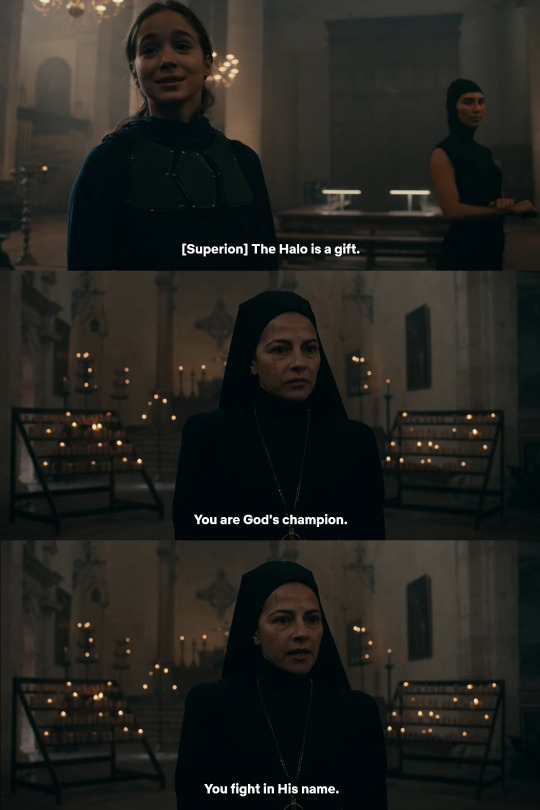

If we are to take a deep dive, it is best to assure the place we're leaping from is stable, so let's do that by starting with the obvious.
The subject in both of these sentences is the same: the Halo. Both of these characters have borne it. Both sentences present the same grammatical structure and answer directly to one another despite the distance in time and space between one and the other's utterances. To Ava, the receiver of these conflicting messages, both claims prove themselves to be ultimately true, for the Halo acts as a gift, in granting her a second chance at a life she never had, and also as a burden, as it imposes on her responsibilities and demands of her sacrifices she would otherwise have never known.
But the show itself openly invites us to dig deeper, so we should not be contented with the obvious alone.
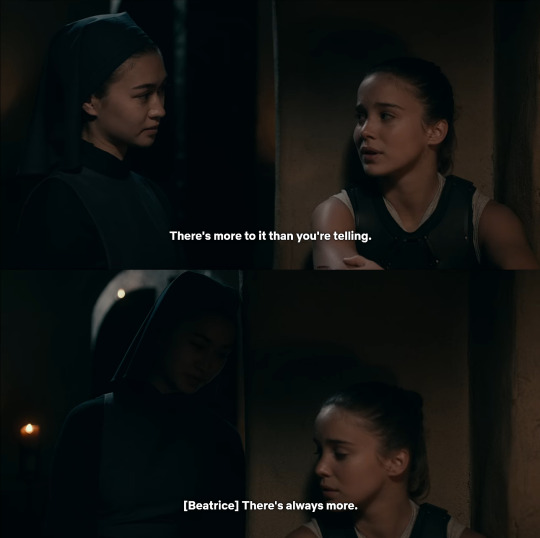
If there is always more, then we must peel back the surface and peek at what is underneath if we are to grasp at least a fraction of the functioning of Warrior Nun in different levels—be it in small scale, pertaining to the characters themselves, or be it in large scale, including how all of it relates to us as viewers in the end.
These two moments of season one are but a fragment of the show’s comprehensive universe, but we will examine them closely to see just how much meaning we can find in them, deceptively simple as they seem.
As mentioned above, the grammatical structure of both sentences is shared between them: “the [subject] is a [noun]”. This could lead to some sort of direct description we associate with the act of definition, of explaining what something is, as in “the pope is a man” or, to use the same reference as Mother Superion and Shannon do, “the Halo is an object”. In fact, had this been the case, we would have been closer to Ava’s own conclusion of the Halo being “a hunk of magic metal embedded in [her] back”, as this is a characteristic anyone could ascribe to it upon examination.
Yet the words used by both former warrior nuns are “gift” and “burden”. If they describe the Halo, then it is not in terms derived from objectively observable traits it possesses (such as it being made of metal), but in a wholly subjective manner. When Mother Superion and Shannon say the Halo is this or that, both imply that it is this or that as relates to themselves. In relaying what the Halo supposedly “is” to Ava, they pre-interpret it for her, infusing it with their own points of view—their beliefs. What they say of the Halo is much more a reflection of who they are than anything the Halo in itself could be.
A) The gift
A gift is, as we know, a present. It presupposes a giver and a receiver, as well as some degree of gratitude on the part of the latter, even if justified by politeness alone.
Mother Superion, embodying the authority of the Catholic church, framed by candles and an altar behind her while making use of short, straightforward affirmations, does not need to clearly state who occupies these positions: we can safely infer that the giver here is God and the beneficiary of this divine benevolence is Ava. A definiteness is patent in the sentences that follow—here is the power of the institution at work, for if Mother Superion starts out by “defining” the Halo, now she defines Ava through it. An inversion takes place, as the woman allows the object to define the woman (as “God’s champion” who “fights in His name”) rather than the other way around. The church, the Halo construct Ava as a subject, subjecting her to certain ideas of what she should be. She is the warrior nun despite having no say in it, not being a warrior and much less a nun.
At first sight, it wouldn’t make sense to interact with Ava in these terms, especially if, by this scene, Mother Superion has already read her file. It wouldn’t be difficult to deduce how expressions crafted with religious colours might impact an audience that does not show any religious proclivities. Furthermore, the tradition of rhetoric has always taught that speakers ought to adapt to their listeners if they wish to get their point across, so either Mother Superion is incompetent at communication, lacking sensibility and skills, or she is making a calculated move—one that is fully supported by her hierarchical position. After all, superiors seldom need to rationally convince their subordinates of doing something given how the latter are compelled instead by power dynamics to get in line—or else.
The strategy doesn’t really work on Ava.
In semiotic terms, we could even argue that there is something confusing happening in this scene—a narrative phase of manipulation (wherein someone tries to get someone else to accept and do something), we could say that it contains hints of both seduction (a positive commentary on the interlocutor—it’s not just about anyone who can be god’s champion, so this is a positive distinction) and intimidation (the threat of negative consequences if the interlocutor doesn’t comply—there is an implied order in the sequence, meaning Ava cannot refuse to be “God’s champion”). Ava might not share in this world-view, but it is what the church and its followers propose: a gift from God is a positive value. Being chosen by God to do something, even fighting and possibly dying in the process, is a positive value. Lilith is standing right there beside them and, at this point, she would surely agree and see nothing of this exchange in a negative light.
Yet Ava isn’t a nun and indeed she does not perceive any of these “honours” as being desirable. Mother Superion’s stance, the image she presents of herself as a strict nun herself when Ava has been mistreated by them all her life, equally gives her no reason to be persuaded, much on the contrary.
The manipulation fails. Ava is told God gave her the gift of life… And that now she is to endanger and potentially lose that very same life as some sort of gesture of gratitude. The logic is unimpressive at best and frankly absurd at worst.
Within the framework of the church, however, it makes perfect sense. Misattributed and misconstrued as it might be, the motto of credo quia absurdum is still pertinent: “I believe because it is absurd”. That a god should grant life only to claim it back through violence is perfectly acceptable if one believes in this god’s unquestionable authority rather than seeing this demand as something ridiculous or cruel.
The very concepts of God, service, battle, duty, blessings only make sense to the faithful, something Ava isn’t. She’s just a puny little individual resisting the pressures brought upon her by a powerful institution.
She and Mother Superion are only speaking over one another, not really having a conversation; Ava doesn’t care to listen to what the church has to say, she doesn’t take it seriously, and the church likewise does not take her individuality, her person into consideration.
However, we would do well to remember that Mother Superion is not simply a mouthpiece for the church—she is also Suzanne, lowly little individual with lowly individual desires and resentment just as Ava.
And, regardless of the effacement of self that monastic as well as military institutions enforce on their members, just as Ava’s subjectivity isn’t neatly negated by direct statements in line with reigning dogma, Suzanne’s own subjectivity also seeps through her words and attitudes. If not blatantly, at the very least there is a remarkable struggle taking place within her, suggested by her use of language as well as her demeanour.
The Halo, after all, defines her as well.
If bearing it is the greatest honour, a mark of God’s favour, if it defines a person, then losing it has an equal power of definition. The distinction it confers on someone is inescapable, for good or ill, and either one dies gloriously as “God’s champion” or one survives it, survives its removal, and is deemed rejected and unworthy by this so magnanimous God. The Halo soaks up all of the positive value ascribed to it—meaning those who lack it adopt a negative one in contrast, be it Suzanne who had it and lost it or even Lilith, who should’ve had it and didn’t.
Still it is considered “a gift”, something given by God… One could say it is a form of grace.
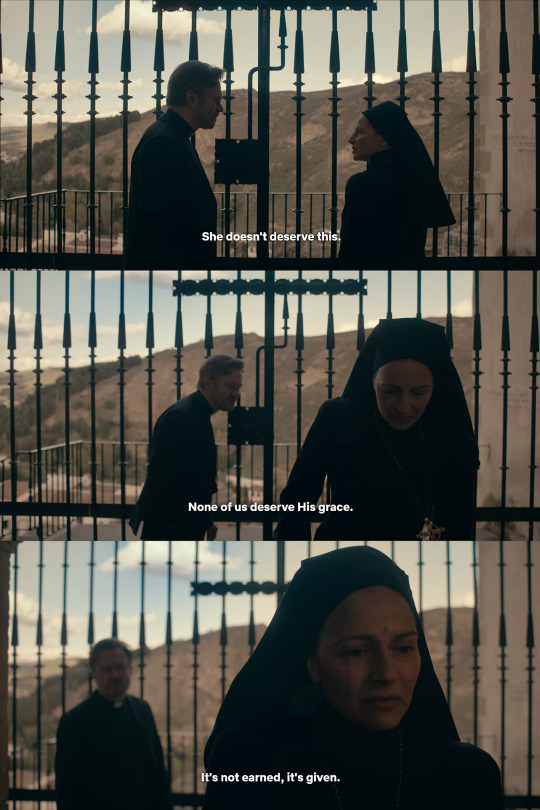
Suzanne’s noun and Vincent’s verb have the same origin, of course, the same stem. Despite the argument between them in this other scene, ultimately there is agreement between the two of them judging by their choice of vocabulary and Mother Superion’s reaction immediately afterwards. If this were not true in some degree, there would have been little need for Mother Superion to correct Ava in the first place, for Ava calls the Halo “a hunk of magic metal”, yes, but she also refers to it as “top prize”, as a reward—which, unlike “gifts”, are meant to be earned, to use Vincent’s comparison. There is a mixture of concepts here.
Without wanting to overcomplicate this text, let us say that ideology is a certain way of understanding the world and that it constructs and is constructed by our discourse, our use of language. One of the functions of ideology is that of attempting to smother contradiction, to smoothen the world’s complexities, simplify them, rationalise them away, however incapable it truly is at accomplishing that given how reality is too complex to be so tamed. Here, then, we see a notable sort of contradiction in Mother Superion’s discourse (in her ideology) that isn’t easily solved: a detail, a problem left out from the thought system. She agrees that grace, in the form of the Halo or not, is given, yet she treats it as if it were earned. This is a crack in the wall; it’s an idiosyncrasy, proof of a subject torn between the different voices that compose her subjectivity, the fragments, the different discourses that, put together, make her up as a whole.
What could be more contradictory than calling something which has scarred her physically, mentally and emotionally a “gift”?
If we create and are created in turn by means of discourse (“you are God’s champion”), if we can only understand and interact with the world when it is mediated by discourses and their correlated ideologies, what would it have meant if Suzanne had assigned another value to the Halo?
The inversion of values would certainly have ejected her from the church. If the Halo, to her, gained negative value, thus allowing her to retain some amount of positive value, her participation in the institution would be impracticable. She would be at odds with the dominant ideology, its structures, its rules… And she would face the resistance Ava faced by assuming such antagonism.
And sure, she might have regained some sort of “freedom”, but what would she have then lost? Resentment or not, there appears to be one central, recurrent positive value, one central desire to most characters in Warrior Nun and it would not be far-fetched to assume Suzanne shares in it herself and is unwilling to part with it.
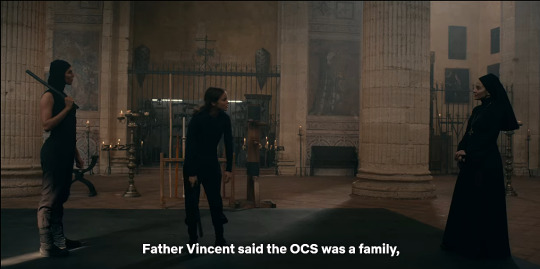
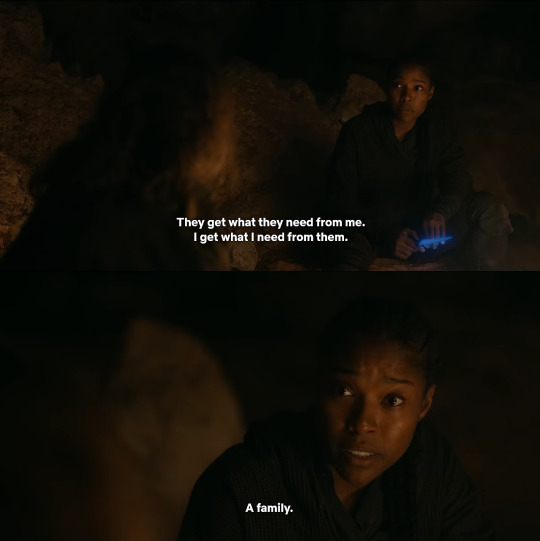


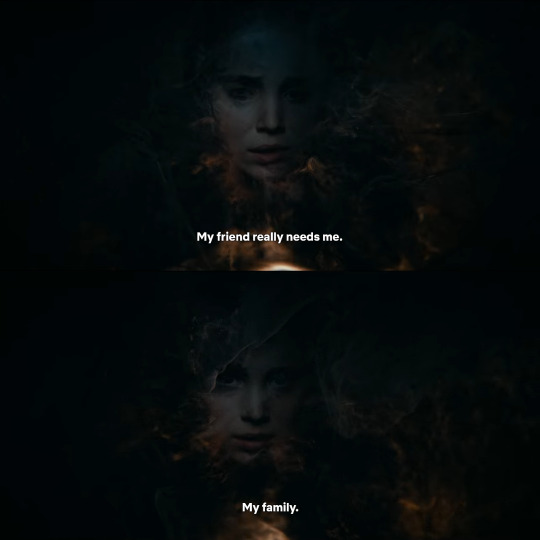

B) The burden
Needless to say that if there is a generous deal of “burden” to Suzanne’s “gift”, there is also some “gift” in Shannon’s “burden”, judging by her mentioning the family she gained through bearing the Halo. Curiously enough, the dynamic of receiving something and paying for it with that very “gift”—Shannon getting a family and losing it by the very same means—is identical to the dynamics involved in getting Ava to accept her fate as warrior nun, by “paying” for the “gift” of life by risking that very same life in battle.
Shannon has received the “gift”—and fulfilled her role to perfection, allowed to thank God for it personally… If the Halo was taken from Suzanne, Shannon is the one “taken” because of it, alongside other ex-bearers.
Here there are no euphemisms. Shannon has lived the consequences of being “God’s champion” until the very end, so she has no need for distorted truths meant to keep things in order, to avoid questioning the principle of order itself which is the institutional view. There is still a struggle (there is always a struggle) as she admits to finding something positive (a family) through her loyalty to the cause even if the cause is what kills her and other women like her. The contrast between Mother Superion’s speech focused on individual responsibility and Shannon’s avowal of how it is “too great for one person to bear” tells us more than enough about how they each envision individuality, community, the possibility of action, who can make it come about—how life and death, different paths, different destinies, inform perception of the same thing.
Their values are inverted.
Mother Superion’s “gift” is Shannon’s “burden”; Mother Superion’s tendency, while alive, to value death (“You fight in His name”) is countered by a dead Shannon’s valorisation of life (“So much promise unfulfilled. So much life unlived. And for what?”) The scenes are in direct opposition to one another, they respond to one another as mirrored images.
So much so that the reply is not merely linguistic, hidden away in dialogue, but quite evidently displayed in visual terms as well. A mirror offers us reflections that are inverted—left in place of right, right as left—and so are these scenes inverted in relation to one another: in the moment of saying the sentences we’re concerned with, Mother Superion and Shannon stand in much the same place. If we do not notice, it is because the camera pans around in different angles—with the former, we watch the scene from a point at Ava's left, while the latter is shown from an angle at her right. We are literally treated to reflected images, seen from opposite points of view.

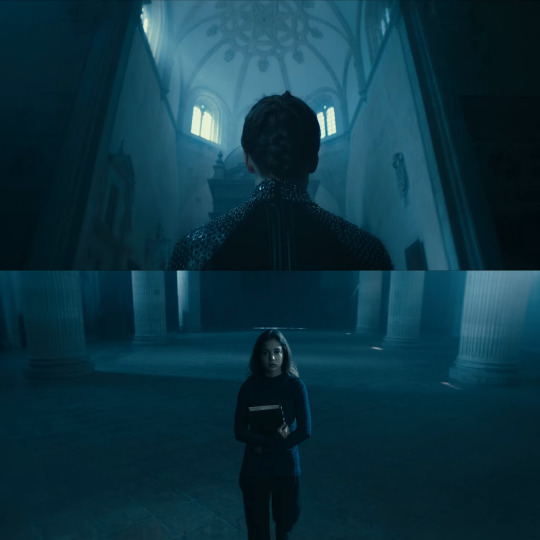
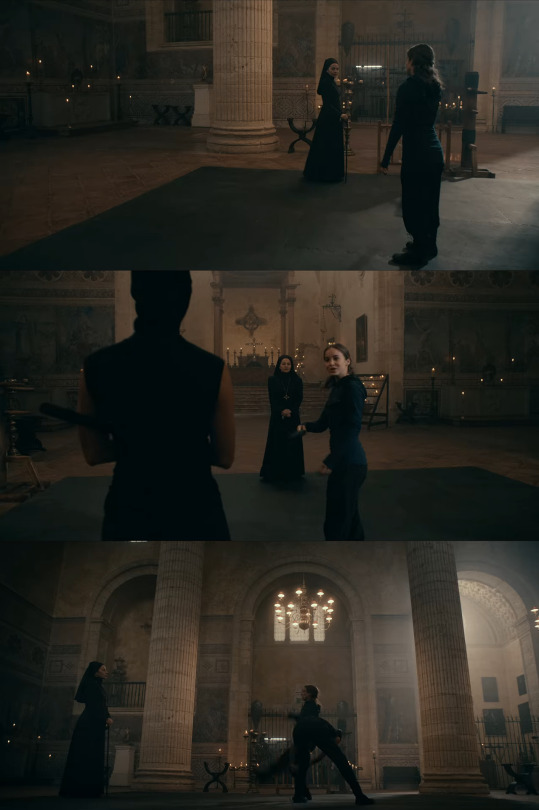
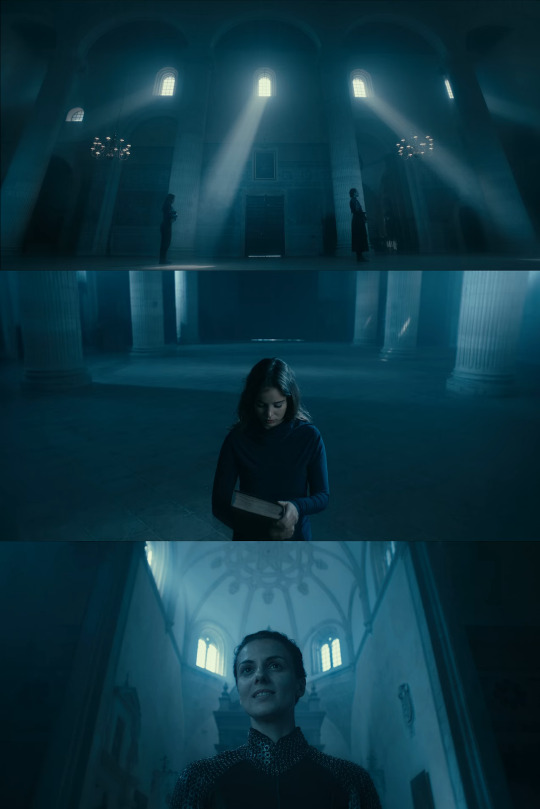
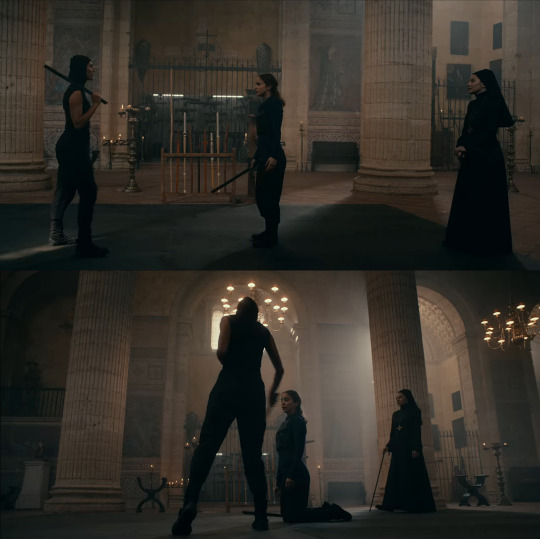
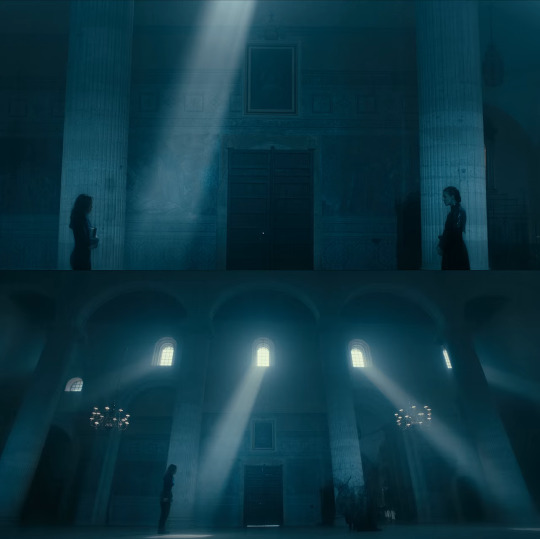
Colour, too, guides our reading of both scenes set side by side. With Mother Superion, we are in the realm of the church and its associated earthly tones as established throughout the first season, whereas Ava’s vision of Shannon paints the dream church in a shade of blue. Blue is, of course, the hue which had been mostly tied to Jillian Salvius, to ArqTech, to science. With science comes the concept of reason, as opposed to the sepia haze of faith.
Mary is also drawn against a backdrop of bright blue sky when she is investigating the docks and relying on her reason rather than her faith concerning Shannon’s death.
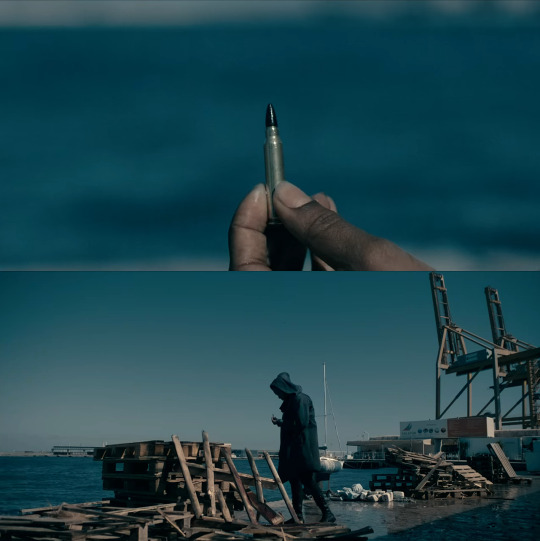
Shannon’s opinion on the Halo might be just as subjective as Mother Superion’s before her, but it is filtered through personal experience and observation, through reason rather than blind belief in a mission.
Yet we are forgetting something. Ava, having died already, claims there is nothing on the other side. If that is so, why is she meeting Shannon now? And why is this meeting taking place in circumstances that reflect previous events in an inverted manner?
As dreams often reuse what we have lived when awake, re-rendering our memories, transforming them, so it is possible that Ava is not having a vision but a dream—that she is talking not to Shannon, but to some facet of herself, Ava, manifesting as Shannon after connecting with her memory through the warrior nun book.
As Ava clings to it and the knowledge it affords her, it would make sense for her conscience to finally figure out a proper retort to what she heard of Mother Superion in that earlier moment, a retort fuelled by new information and by her own reasoning. At the very least, it would be more plausible to consider this hypothesis than to assume her vision of Shannon is a real communication with her spirit granted by the Halo, for, if we are witnessing a new phase of manipulation, then the message being transmitted this time concerns the Halo’s “lifecycle” itself—and how it must be brought to an end. If it is sentient as some characters believe, why would it let Ava meet Shannon and be exposed to the idea of working against the Halo’s own interests of perpetuation?
After all, the implications behind Shannon’s words are evident: again, if the Halo also defines the woman, then it defines sister Shannon, sister Melanie and all other warrior nuns going back to Areala with one word which will soon apply to Ava and whomever follows: that word is dead, crushed under the burden.
And this time, the message, a sort of compassionate provocation (“a burden too great to bear”—even for you), hits its mark, inspiring Ava to end the tradition and be the last warrior nun.
We are not in the semantic field of religion, even if it is there, in the background, being answered to; here we are not speaking of God or battles fought for this distant general in the sky, but of family, of women slaughtered in the name of a mission. This is no longer some ethereal question but an immediate concern. Whether this is Shannon or Ava herself subconsciously masquerading as Shannon to facilitate her own “awakening”, the point gets across now that it is transmitted in language that makes sense to Ava, now that there are common values between speaker and listener.
One could even hypothesise that, at this point, Shannon being a former warrior nun lends credibility to her words in Ava’s mind as she is a woman experienced in this role Ava is supposed to play.
If so, we can also understand the bridge of empathy that is built between Ava and Mother Superion later on when it is revealed that Suzanne, too, was a halo bearer and that she, too, has carried this “burden”. Both forge new understandings of one another through this common background and a personal exchange that is nothing like their first encounter—when the “gift” is said to have rejected the older nun, when its “burden” is divulged to Ava.
As Ava recognises Shannon, so do Ava and Mother Superion eventually recognise one another as well—so do they begin to comprehend how they did carry similar values, only obscured by their dissimilar ideologies and their resulting language use. If no other, then the value of family is what binds them together through Suzanne’s new disposition to embrace all of her sisters and Ava’s newfound conduct in considering them her sisters to begin with. They come closer in the catacombs and, at last, meet halfway by season two.
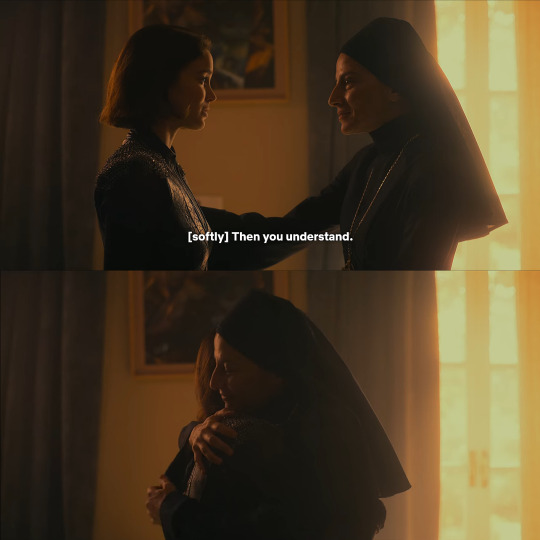
Yet we, the viewers, as touched by this miscommunication that ends well as we may be, after all of this talk of gifts and burdens, we remain none the wiser on what the Halo actually is.
C) The energy source
As previously exposed, we are kept in the dark because most sentences that speak of this iconic object in the series are subjective, focused on the characters’ own relationship to it or their ideas about it rather than any substantial data on what it might truly be apart from a “hunk of magic metal” currently in Ava’s back.
Perhaps because we spend so much time with the nuns, satisfied as they are with the logic of plain belief instead of concerned with tangible, provable things that can or should be explained. The most we get is the information on how the Halo is some kind of weapon, an amplifier attuned to the bearer’s body and soul.


Enter Jillian Salvius.
While her understanding of the Halo is admittedly insufficient, her research on it limited, her available vocabulary and scientific knowledge too slim (!) to encompass such an item, she does not say something like “the Halo is a mystery” or “a conundrum” as she says of Lilith later on. It would be true, just as it being a “gift” or “burden” is true considering those who called it thus, yet Jillian uses another sort of language instead.

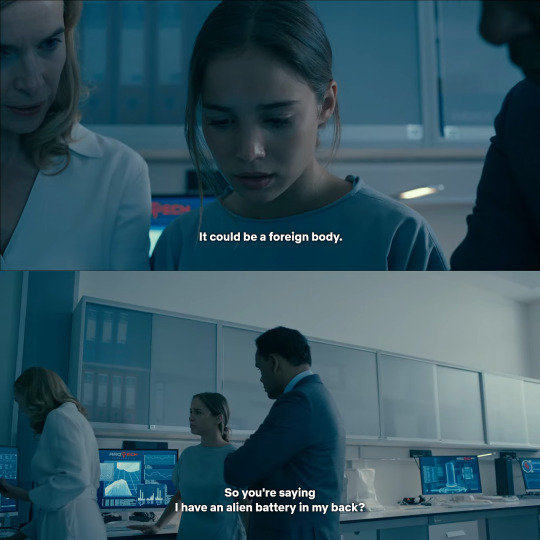
Being a scientist, doctor Salvius opts for what we consider to be appropriate scientific modes of speaking, that is, by creating an impression of objectivity. It is not her personal reaction or opinion of the Halo that she offers, but whatever traits she can see or learn of in that moment: an energy source, an object that defies physics, a foreign body of undefined material. Ava “translates” this as being “an alien battery”, but the fact is that we are served a definition of the Halo unlike those we had before. It isn’t much, but for once we are not given a character’s personal interpretation of it…
Or so it seems. We none of us are capable of being fully objective, for none of us can rid ourselves of our selves—Jillian posits the Halo as an energy source, which seems innocent and impartial enough, but soon afterwards we understand what that means to her.
In themselves, the words “energy source” don’t carry many other connotations. Yet, for Jillian, these words that seem so neutral and “scientific”, so clear cut, do not sustain the facade of objectivity. She has spoken of energy before, it is an active component of her research, a common word in her lexicon; to Ava, “energy source” is “a battery”, but to Kristian and Jillian, who are part of ArqTech, who know what goes on within its walls, these words automatically acquire another meaning.
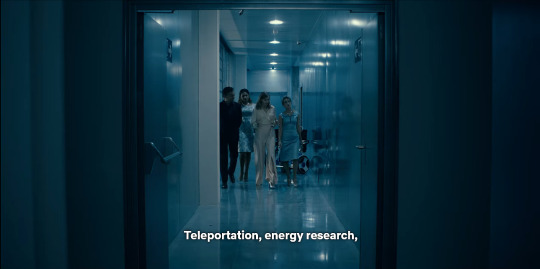

Yes, that of a battery, but one with a very specific purpose. Under the guise of neutral discourse, a very personal interpretation of the Halo, just as if it were a “gift” or “burden”, lies hidden. It is an energy source—one that doctor Salvius can potentially use to power her contraption. It is a “solution”, perhaps even a “gift”, of circumstance if not of god.
And it, too, defines Ava despite herself. When it fails, Jillian says she was wrong about Ava, not the Halo, thus conflating the two.
In the end, even she who might well be the smartest character, the one most closely connected with science and concrete knowledge, cannot guard herself from letting the unsaid (or “unsayable”) slip through her lips. She, too, in spite of her apparent objective language, exhibits a subjective kind of relationship with the world around her, influenced by the ideologies that cross her being.
D) Ending thoughts
Perhaps, when all is said and done, we are never truly able to follow that maxim we’ve seen more than once on Warrior Nun.

Perhaps we simply cannot think or act if we do not perceive things as at least partially related to ourselves.
It is not necessarily a bad thing, though, as long as different views can coexist, as long as they do not trample one another, as long as one person or group don’t elect themselves as the owners of truth, attempting to eliminate all who do not follow them as Adriel tried to do. In a democracy, in a place and a moment in history where there is freedom of thought and creed and speech, the phenomenon of various voices competing for the spotlight, taking turns under it is normal and healthy.
Warrior Nun gives us a fascinating insight on the multiplicity of voices that compose a society, even if there are elements of it which seek to suffocate those voices. It is a microcosm where different ideologies, through language, are confronted with one another, where they struggle to make sense of things—and where each of those points of view over a given subject might carry a morsel of truth. The Halo is a piece of metal and a gift and a burden and an energy source; none of these ideas or perceptions necessarily exclude the other, none is “more correct” than the other because, if so, then the question would be: as regards which character?
To Ava, at least, it is all these things and maybe more.
There are attempts to implant a hegemonic interpretation of facts. The very story of Areala, Adriel, the Halo’s trajectory along the centuries, how this is “the way it has been for one thousand years” is a strategy to cement a singular view. The repetition, the constant reworking of tradition, telling this story over and over with each warrior nun… That is the church at play, ideology trying to fill in any gaps, keep things as they are, conserve them and the structures that organise them, guaranteeing that things have one certain sort of sense and not another, one value, one meaning.
But life is not stagnant and people are not all swallowed whole by ideology even when they subscribe to it willingly, as a member of a church would. There are always things that cannot be explained, things that are beyond the scope of ideology—contradictions, pesky little details that escape the invisible goggles with which we look at reality. The truth is that it is far more complex than we can contain it with a few buzzwords, man-made or divine. There is always another side, always a reply, a constant dialogue between our different ways of seeing, understanding, being and, therefore, speaking.
A more visible example comes from those scenes in season two where Yasmine and Adriel are both telling the exact same story, only through their own perspectives, interpreting it in their own ways.
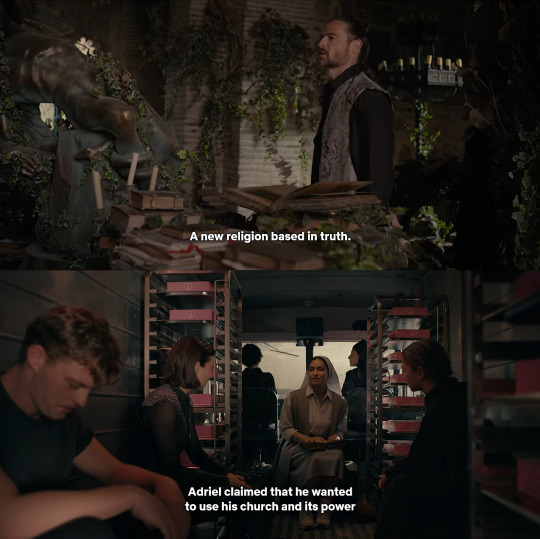

The show provides many opportunities to see how varied human voice can be, how the point of view of whoever is telling the story bears a mighty influence on the narrative, whether consciously or not, malicious or not. That, in turn, may inspire us to look around us, in the real world; to look at how we are representing things, others and even ourselves as well as how others represent us through the words we use.
This is not an exhaustive study, long as it is. As said before, it is but a glance at two scenes, two little lines of dialogue which are, however, intimately connected with others, with the stuff of the entire show—with the stuff of life. We could write more on how possessive pronouns and other sorts of phrases with the idea of the Halo “belonging” to someone or being “owned” by someone are used, just to remain in the area of discourse about the Halo alone.
But the present text has given all it had to give and its author does not wish to be a burden on her readers any more than she already has been.
#i'm sorry i took this long to get back to this ghost oh my god jsdfjsd it's been in my drafts forever#but i'm reading a book about the technique of debating and a light went off in by brain#finally the reply i wanted to write down found the correct words inside my mind lol#anyway. i would have loved for us to get more areala insights... or even those of other warrior nuns altogether#(we could say we did get one this season... suzanne's! and for that i am grateful because ha ha THAT SCENE)#(as a proud member of team superion that flashback does things to me. oh my oh my. hello. ma'am.)#AHEM.#i'm a firm believer in things staying alive even after they've ended. it all comes down to how we treat them#nowadays everyone likes jumping from fandom to fandom every other week -- just as benefits streamers#but if we love a thing we do stick to it for longer periods of time i think#there's still new fic coming out for xena (i just checked lol)! shows live as long as we tend to their fire...#analysis and similar#exercises in observation#ghostofcatscradle
143 notes
·
View notes
Text
Why Warrior Nun characters annoy people on the internet
Ava: posts the stupidest memes
Beatrice: corrects people's grammar
Camila: her every comment contains a "like Dolly Parton said [...]"; perfect selfies without any effort
Lilith: edgy quotes; too many selfies with her boyfriend
Mary: comments "cringe" under everyone's posts; pictures of her guns
Mother Superion: interrupts people's fights with "Basta!", and why the fight is idiotic
Jillian: ruins everyone's fun by pointing out incorrect details in the comments; too many posts about her kid
Adriel: influencer™; cryptic posts about his ex
Yasmine: too many long posts
Vincent: sad drunk rants
Michael: gets into arguments with FBC members all the time, and he eggs them on
Reya: weird posts people suspect of being an ARG; she mostly annoys Adriel
Areala: all her posts are either about God, or about her friend group
Kristian: raves about his "Lord and Savior" all the time (any out of place youtube comments about Adriel are probably him)
Shannon: too many selfies with her girlfriend
Duretti: rants about politics; cryptic, sarcasm-filled comments
Sister Dora: her gym videos make everyone jealous
William: creep™
#warrior nun#warrior nun meme#warrior nun crack#warrior nun fandom#wn meme#wn crack#wn fandom#ava silva#sister beatrice#sister camilla#sister lilith#shotgun mary#mother superion#jillian salvius#adriel#sister yasmine#father vincent#michael salvius#reya#areala#kristian schaefer#sister shannon#cardinal duretti#sister dora#william foster#diary pages#thought journal#confessions of a madwoman#i don't know why did i do this#i am procastrinating
43 notes
·
View notes
Text
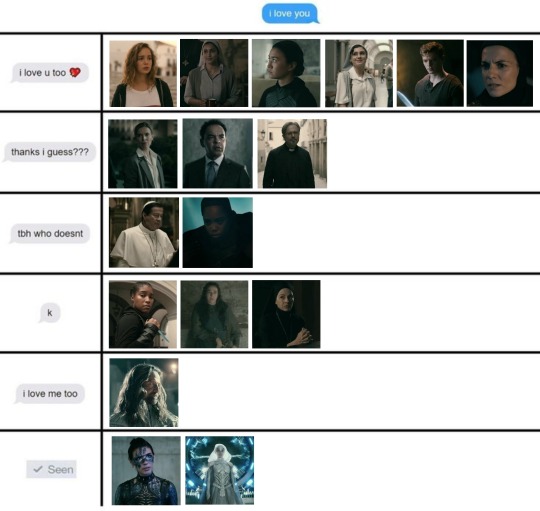
Because the writing is going slowly again
#warrior nun#warrior nun fandom#wn fandom#warrior nun meme#ava silva#sister yasmine#sister beatrice#sister camila#michael salvius#sister shannon#jillian salvius#father vincent#pope duretti#sister dora#shortgun mary#areala of cordoba#mother superion#adriel#sister lilith#lilith villaumbrosia#reya#humor#character aligment chart#i really do these when i have a moment but not enough time for anything meaningful#atsbb is really going too slow now ava's petting glorious (the sword) like a dog#i have a couple chapters plotted but now I have to execute what i plotted#a lot of softies in this show but camila fits under the “tbh who doesn't”#and there was no perfect one for jillian#adriel my beloved narcissist
29 notes
·
View notes
Text
INSANITY (Hellaverse x isekai male reader) Winners (Part 2):
•Adrian Newey (F1/Formuala 1/oscar piastri/Ferrari/Austin gp 2024)
•Black Widow (Florence Pugh)
•Haruka Sakura (Wind Breaker)
•Danny Phantom (Danny Phantom)
•Wonder (autism/neurodivergent)
•Donald Trump (Us politics/Presidential debate/United States/election/American politics/Us elections/Election day/Presidential election/2024 Presidential election)
•Joe Biden (Us politics/Presidential debate/United States/election/American politics/Us elections/Election day/Presidential election/2024 Presidential election)
•Kamala harris (Us politcs/Presidential debate/United States/election/American politics/Us elections/Election day/Presidential election/2024 Presidential election)
•Matthew Domick (nasa/space/astronomy/science/Astrology)
•Elen Musk (Science/physics)
•Beyonce (Beyonce)
•Ponyboy Curtis (The outsiders)
•Aurora (Witchcraft/Witchblr)
•Malefica (Witchcraft/Witchblr/Witch/Wicca/Witchcore)
•Bojan Cvjetićanin (Joker out)
•Kris Guštin (Joker out)
•Jan Peteh (Joker out)
•Nace Jordan (Joker out)
•Jure Maček (Joker out)
•Jannik Sinner (tennis)
•Galadriel (Rings of power/Lord of the rings/Lotr/Tolkien/The rings of power/Gigolas/Elves)
•Ranboo (Youtuber)
•The passengers of the AA 11 (9/11)
•Regan (Inside job)
•Brett (Inside job)
•Kai (Exo)
•Byun Baek-hyun (Exo)
•Suho (Exo)
•Sehun (Exo)
•Park Chan-Yeon (Exo)
•D.O. (Exo)
•Chen (Exo)
•Kris Wu (Exo)
•Huang Zitao (Exo)
•Xiumin (Exo)
•Luhan (Exo)
•Lay (Exo)
•Jere Mikael Pöyhönen (Käärijä)
•Susan Ivanova (Babylon 5)
•Alexander Gabriel Claremont-Diaz (Taylor Zakhar Perez)
•Aabria Iyengar (Critical role)
•Marisha Lay (Critical Role)
•Furbys (Furby/r/196)
•Kirie Goshima (Uzumaki)
•Nora Sakavic (All for the game)
•Owen (I saw the TV glow)
•Dark Cacao Cookie (Cookie run/Cookie run kingdom)
•Golden Cheese Cookie (Cookie run/Cookie run Kingdom)
•Chili Pepper Cookie (Cookie run/Cookie run kingdom)
•Hollyberry Cookie (Cookie run/Cookie run Kingdom)
•Pure Vanilla Cookie (Cookie run/Cookie run Kingdom)
•Stardust Cookie (Cookie run/Cookie run Kingdom)
•White Lily Cookie (Cookie run/Cookie run Kingdom)
•Crimson Coral Cookie (Cookie run/Cookie run Kingdom)
•Elder Faerie Cookie (Cookie run/Cookie run Kingdom)
•Moonlight Cookie (Cookie run/Cookie run Kingdom)
•Mystic Flour Cookie (Cookie run/Cookie run Kingdom)
•Stormbringer Cookie (Cookie run/Cookie run Kingdom)
•Wind Archer Cookie (Cookie run/Cookie run Kingdom)
•Angel Cookie (Cookie run/ Cookie run Kingdom)
•Black Pearl Cookie (Cookie run/Cookie run Kingdom)
•Frost Queen Cookie (Cookie run/Cookie run Kingdom)
•Pitaya Dragon Cookie(Cookie run/Cookie run Kingdom)
•Sea Fairy Cookie (Cookie run/Cookie run Kingdom)
•Sherbet Cookie (Cookie run/Cookie run Kingdom)
•Fox Mulder (Txf/The x Files)
•Dana Scully (Txf/The x Files/Gillian Anderson)
•Agatha Harkness (Agatha all along/Kathryn Hahn/Agathario/Disney)
•Haruspex (pathologic)
•John (Outer banks)
•Jack O'Malley (Chris evans)
•Cady Haron (Mean Girls/Lindsay Lohan/october/october 3rd/october 3)
•Areala of Cordoba (Warrior Nun)
•Stede Bonnet (Ofmd/Our Flag means Death)
•Liam Gallagher (Oasis)
•Noel Gallagher (Oasis)
•Paul Arthurs (Oasis)
•Tony McCarroll (Oasis)
•Gem Archer (Oasis)
•Andy Bell (Oasis)
•Chris Sharrock (Oasis)
•Paul McGuigan (Oasis)
•Alan White (Oasis)
•Evgeni Malkin (Pittsburgh penguins)
•Kate McKinnon (snl)
•Travis Kelce (Kansas City Chiefs)
•Keith (Voltron/vld)
•Shiro (Voltron/vld)
•Pidge (Voltron/vld)
•Lance (Voltron/vld)
•Hunk (Voltron/vld)
•Princess Allura (Voltron/vld)
•Vex'ahlia Vessar (Vox Machina/Critical Role/Dimension 20/Misfits and Magic)
•Vax'ildan Vessar (Vox Machina/Critical Role/Dimension 20/Misfits and Magic)
•Percival de Rolo (Vox Machina/Critical Role/Dimension 20/Misfits and Magic)
•Pike Trickfoot (Vox Machina/Critical Role/Dimension 20/Misfits and Magic)
•Keyleth of the Air Ashari (Vox Machina/Critical Role/Dimension 20/Misfits and Magic)
•Scanlan Shorthalt (Vox Machina/Critical Role/Dimension 20/Misfits and Magic)
•Grog Strongjaw (Vox Machina/Critical Role/Dimension 20/Misfits and Magic)
•Alice Oseman (Heartstopper)
•Al Pacino (60s/Cinema)
•King Arthur (Merlin)
•Merlin (Merlin)
•Goodtimeswithscar (Trafficblr/Traffic smp/mineblr/Solidaritygaming/Wild life smp)
•Grian (Trafficblr/Traffic smp/mineblr/Solidaritygaming/Wild life smp)
•Mumbo Jumbo (Trafficblr/Traffic smp/mineblr/Solidaritygaming/Wild life smp)
•Skizzleman (Trafficblr/Traffic smp/mineblr/Solidaritygaming/Wild life smp)
•Bdoubleo100 (Trafficblr/Traffic smp/mineblr/Solidaritygaming/Wild life smp)
•Tangotek (Trafficblr/Traffic smp/mineblr/Solidaritygaming/Wild life smp)
•Florence Welch (Florence and the Machine)
•Isabella Summers (Florence and the Machine)
•Robert Ackryod (Florence and the Machine)
•Hazel Mills (Florence and the Machine)
•Tom Monger (Florence and the Machine)
•Loren Humphrey (Florence and the Machine)
•Tom Moth (Florence and the Machine)
•Aku Orraca-Tetteh (Florence and the Machine)
•Cyrus Bayandor (Florence and the Machine)
•Dionne Douglas (Florence and the Machine)
•Chris Hayden (Florence and the Machine)
•Mark Saunders (Florence and the Machine)
•Rusty Bradshaw (Florence and the Machine)
•Samantha White (Florence and the Machine)
•Roz (The wild robot)
•Hayley Williams (Paramore)
•Ichigo kurosaki (bleach)
•Bjork (Bjork)
•Sparkle (Honkaistairrail/Hsr/DATENROUTE/Hoyocreators)
•Historia (Attack on Titan/Aot)
•Shajar (Riseofkingdoms/Egypt/History/Didyouknow)
•Haruto Soma (Kamenrider/Kamenriderwizard)
#F1#adrian newey#hazbin hotel#darren criss#wind breaker#danny phantom#autism#Donald Trump#Joe Biden#kamala harris#nasa#beyonce#bb26#The outsiders#Witchcraft#Witchblr#Joker out#Kawaii#Tennis#fall#Romantic academia#ao3#Rings of power#Ranboo#Stray kids#9/11#911 abc#Bojan cvjeticanin#Inside job#Exo
7 notes
·
View notes
Text

Art by Nozomu Tamaki featured in Warrior Nun Areala: Portraits (1996)
#warrior nun areala is such a great source of odd mildly fetishistic nun content#warrior nun#nun#nunsploitation#nunposting#comics#90s#anime#christianity#art#fanart
2 notes
·
View notes
